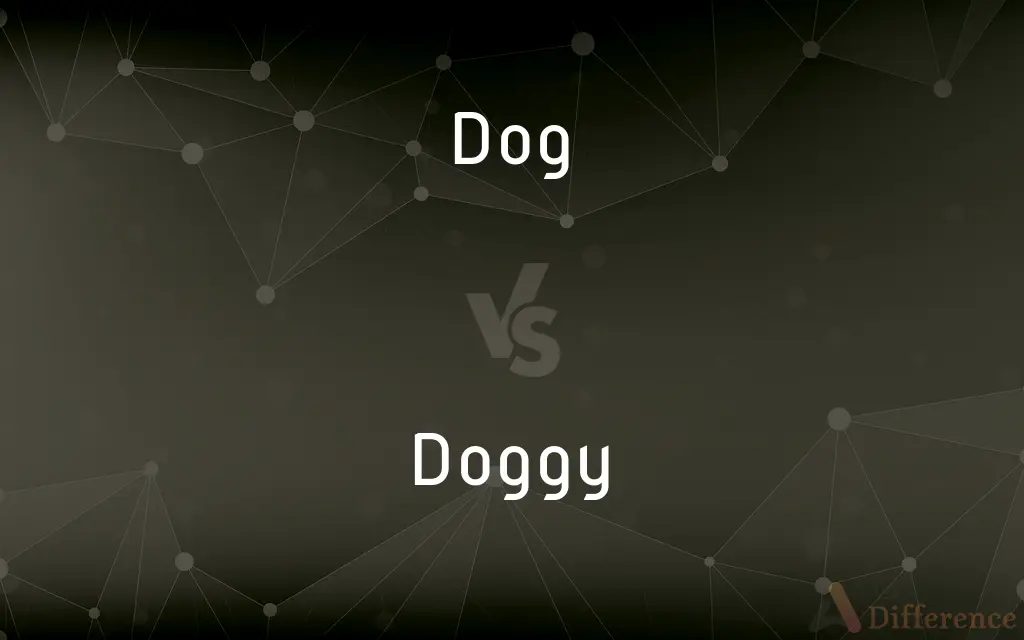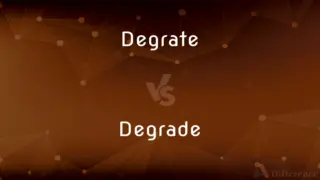Dog vs. Doggy — What's the Difference?
Edited by Tayyaba Rehman — By Maham Liaqat — Updated on March 20, 2024
Dog refers broadly to the domesticated canine species, while doggy is a more affectionate, diminutive term for a dog, often implying cuteness or small size.

Difference Between Dog and Doggy
Table of Contents
ADVERTISEMENT
Key Differences
Dog is a term used to describe any member of the species Canis lupus familiaris, ranging from tiny Chihuahuas to large breeds like the Great Dane. It is a general term that covers all types and breeds of domestic dogs. On the other hand, doggy is a diminutive form of the word "dog," used to convey affection, cuteness, or smallness. It's often used in more casual, endearing contexts, such as when referring to pets in a loving manner.
While "dog" is used in formal and informal contexts alike, covering a wide range of discussions about the species, "doggy" is predominantly used in informal settings. The term "doggy" carries a connotation of warmth and affection, making it less suitable for scientific or formal discourse about canines.
In terms of usage, "dog" can be applied universally to the species when discussing behavior, breeds, training, and other aspects of canine life. Conversely, "doggy" is more likely to be used in conversations about pets, especially in situations emphasizing the emotional bond between the dog and its owner, such as "I’m taking my doggy to the park."
The use of "doggy" also reflects the speaker's relationship with the animal; it's less common to refer to working dogs in professional settings, like police or service dogs, as "doggies." This distinction underscores the term's role in expressing affection rather than denoting function or role.
Both "dog" and "doggy" have found their way into various idioms and expressions, though with different tones and implications. "Dog" appears in phrases that may not necessarily reflect affection (e.g., "dog-eat-dog world"), whereas "doggy" does not commonly feature in idiomatic expressions due to its informal nature.
ADVERTISEMENT
Comparison Chart
Definition
A domesticated carnivorous mammal, Canis lupus familiaris.
Affectionate, diminutive term for a dog, implying cuteness or small size.
Connotation
Neutral, broad term for the species.
Affectionate, implies cuteness and is often used for smaller dogs.
Usage Context
Formal and informal; universal for species.
Predominantly informal and affectionate.
Relationship Implication
General, includes all types of relationships with humans.
Implies a closer, affectionate relationship.
Common in Idioms
Yes, e.g., "dog-eat-dog."
Rarely, if ever, used in idioms.
Compare with Definitions
Dog
Domesticated carnivorous mammal.
Dogs are known for their loyalty.
Doggy
Affectionate term for a dog.
My doggy loves to cuddle.
Dog
Informally, can imply a contemptible person.
He was called a dog for his betrayal.
Doggy
Often implies a small or cute dog.
Look at that little doggy in the window!
Dog
A member of the species Canis lupus familiaris.
She adopted a dog from the shelter.
Doggy
Rarely used in formal contexts.
Bring your doggy to the pet event.
Dog
Also, used in various expressions.
It's a dog-eat-dog world.
Doggy
Can denote pet-related products or services.
She bought a new doggy bed.
Dog
Used to refer to a male dog specifically.
The dog won several awards at the show.
Doggy
Used in familiar and affectionate contexts.
Who's a good doggy?
Dog
The domestic dog (Canis familiaris or Canis lupus familiaris) is a domesticated descendant of the wolf. The dog derived from an ancient, extinct wolf, and the modern grey wolf is the dog's nearest living relative.
Doggy
Of, relating to, or suggestive of a dog; doggish.
Dog
A domesticated carnivorous mammal (Canis familiaris syn. Canis lupus subsp. familiaris) occurring as a wide variety of breeds, many of which are traditionally used for hunting, herding, drawing sleds, and other tasks, and are kept as pets.
Doggy
Variant of doggie.
Dog
Any of various carnivorous mammals of the family Canidae, such as the dingo.
Doggy
A dog, especially a small one.
That's such a cute little doggy, Keira!
Dog
A male animal of the family Canidae, especially of a fox or a domesticated breed.
Doggy
Doggy style.
Her favourite position is doggy.
Dog
Any of various other animals, such as the prairie dog.
Doggy
A junior temporarily assigned to do minor duties for a senior; a gofer.
Dog
A person
You won, you lucky dog.
Doggy
Doggy style.
Dog
A person regarded as contemptible
You stole my watch, you dog.
Doggy
(informal) Suggestive of or in the manner of a dog.
Dog
A person regarded as unattractive or uninteresting.
Doggy
(informal) Fond of dogs.
Dog
Something of inferior or low quality
"The President had read the speech to some of his friends and they told him it was a dog" (John P. Roche).
Doggy
Doggy style.
Dog
An investment that produces a low return or a loss.
Doggy
Informal terms for dogs
Dog
Dogs(Slang) The feet.
Dog
See andiron.
Dog
(Slang) A hot dog; a wiener.
Dog
Any of various hooked or U-shaped metallic devices used for gripping or holding heavy objects.
Dog
(Astronomy) A sundog.
Dog
Totally; completely. Often used in combination
Dog-tired.
Dog
To track or trail persistently
"A stranger then is still dogging us" (Arthur Conan Doyle).
Dog
To hold or fasten with a mechanical device
"Watertight doors and hatches were dropped into place and dogged down to give the ship full watertight integrity" (Tom Clancy).
Dog
To be persistently or inescapably associated with
Questions about his youthful indiscretions dogged him throughout his career.
Dog
To be recurrently or persistently in the mind; haunt
Despair dogged him in his final years.
Dog
A mammal of the family Canidae:
Dog
The species Canis familiaris (sometimes designated Canis lupus familiaris), domesticated for thousands of years and of highly variable appearance because of human breeding.
The dog barked all night long.
Dog
Any member of the family Canidae, including domestic dogs, wolves, coyotes, jackals, foxes, and their relatives extant and extinct; canid.
Dog
A male dog, wolf, or fox, as opposed to a bitch or vixen.
Dog
The meat of this animal, eaten as food:
Did you know that in South Korea, they eat dog?
Dog
A person:
Dog
A dull, unattractive girl or woman.
She’s a real dog.
Dog
(slang) A man, guy, chap.
You lucky dog!
Dog
(derogatory) Someone who is cowardly, worthless, or morally reprehensible.
Come back and fight, you dogs!
You dirty dog.
Dog
A mechanical device or support:
Dog
Any of various mechanical devices for holding, gripping, or fastening something, particularly with a tooth-like projection.
Dog
A click or pallet adapted to engage the teeth of a ratchet wheel, to restrain the back action.
Dog
A metal support for logs in a fireplace.
The dogs were too hot to touch.
Dog
(cartomancy) The eighteenth Lenormand card.
Dog
A hot dog: a frankfurter, wiener, or similar sausage; or a sandwich made from this.
Dog
Underdog.
Dog
Foot.
Dog
(Cockney rhyming slang) (from "dog and bone") Phone or mobile phone.
Dog
One of the cones used to divide up a racetrack when training horses.
Dog
(informal) Something that performs poorly.
That modification turned his Dodge hemi into a dog.
Dog
(film) A flop; a film that performs poorly at the box office.
Dog
(transitive) To pursue with the intent to catch.
Dog
(transitive) To follow in an annoying or harassing way.
The woman cursed him so that trouble would dog his every step.
Dog
To fasten a hatch securely.
It is very important to dog down these hatches.
Dog
To intentionally restrict one's productivity as employee; to work at the slowest rate that goes unpunished.
A surprise inspection of the night shift found that some workers were dogging it.
Dog
(transitive) To criticize.
Dog
To divide (a watch) with a comrade.
Dog
(slang) Of inferior quality; dogshit.
Dog
A quadruped of the genus Canis, esp. the domestic dog (Canis familiaris).
Dog
A mean, worthless fellow; a wretch.
What is thy servant, which is but a dog, that he should do this great thing?
Dog
A fellow; - used humorously or contemptuously; as, a sly dog; a lazy dog.
Dog
One of the two constellations, Canis Major and Canis Minor, or the Greater Dog and the Lesser Dog. Canis Major contains the Dog Star (Sirius).
Dog
An iron for holding wood in a fireplace; a firedog; an andiron.
Dog
A grappling iron, with a claw or claws, for fastening into wood or other heavy articles, for the purpose of raising or moving them.
Dog
An ugly or crude person, especially an ugly woman.
Dog
A hot dog.
Dog
To hunt or track like a hound; to follow insidiously or indefatigably; to chase with a dog or dogs; to worry, as if by dogs; to hound with importunity.
I have been pursued, dogged, and waylaid.
Your sins will dog you, pursue you.
Eager ill-bred petitioners, who do not so properly supplicate as hunt the person whom they address to, dogging him from place to place, till they even extort an answer to their rude requests.
Dog
A member of the genus Canis (probably descended from the common wolf) that has been domesticated by man since prehistoric times; occurs in many breeds;
The dog barked all night
Dog
A dull unattractive unpleasant girl or woman;
She got a reputation as a frump
She's a real dog
Dog
Informal term for a man;
You lucky dog
Dog
Someone who is morally reprehensible;
You dirty dog
Dog
A smooth-textured sausage of minced beef or pork usually smoked; often served on a bread roll
Dog
A hinged catch that fits into a notch of a ratchet to move a wheel forward or prevent it from moving backward
Dog
Metal supports for logs in a fireplace;
The andirons were too hot to touch
Dog
Go after with the intent to catch;
The policeman chased the mugger down the alley
The dog chased the rabbit
Common Curiosities
What is the main difference between a dog and a doggy?
"Dog" refers to any domesticated canine, while "doggy" is an affectionate term implying cuteness or small size.
Can "doggy" be used in formal writing?
Typically, "doggy" is reserved for informal, affectionate contexts and not suited for formal writing.
Can all dogs be called "doggies"?
Yes, but the term is more commonly used for pets or in contexts where affection is emphasized.
Is "doggy" only used for small dogs?
While it often implies a smaller dog, "doggy" can be used affectionately for dogs of any size.
Is there a difference in the emotional impact of "dog" vs. "doggy"?
Yes, "doggy" often carries a warmer, more personal emotional impact than "dog."
Can "doggy" be used in a derogatory way?
It's uncommon, as "doggy" typically conveys affection or endearment.
Does "doggy" appear in idiomatic expressions?
Rarely, if ever, because its informal and affectionate nature doesn't fit the broader application of idioms.
How does the term "doggy" affect the tone of a sentence?
It introduces an affectionate, sometimes playful tone, emphasizing an emotional bond.
Can "dog" and "doggy" be used interchangeably?
In casual conversation about pets, yes, but the choice of term can affect the tone and implication.
Is it appropriate to use "doggy" when referring to working dogs?
Generally, "dog" is preferred for working dogs to maintain a professional tone.
Do "dog" and "doggy" have the same meaning?
While both refer to canines, "doggy" has additional connotations of affection and cuteness.
Why might someone choose to use "doggy" over "dog"?
To convey affection or when speaking to children or about pets in a loving way.
Are there specific contexts where "doggy" should not be used?
In scientific, formal, or professional discussions about canines, "dog" is more appropriate.
How do cultural perceptions of dogs influence the use of "dog" vs. "doggy"?
Perceptions can dictate the appropriateness of using "doggy" for an affectionate touch, depending on societal norms around pets.
How does the use of "doggy" reflect the speaker's relationship with the animal?
It suggests a closer, more affectionate relationship with the dog.
Share Your Discovery

Previous Comparison
Capitalism vs. Feudalism
Next Comparison
Degrate vs. DegradeAuthor Spotlight
Written by
Maham LiaqatEdited by
Tayyaba RehmanTayyaba Rehman is a distinguished writer, currently serving as a primary contributor to askdifference.com. As a researcher in semantics and etymology, Tayyaba's passion for the complexity of languages and their distinctions has found a perfect home on the platform. Tayyaba delves into the intricacies of language, distinguishing between commonly confused words and phrases, thereby providing clarity for readers worldwide.















































